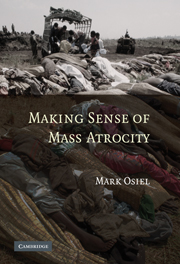Book contents
- Frontmatter
- Contents
- Dedication
- Preface
- Introduction
- 1 The Challenge of Prosecuting Mass Atrocity
- PART I LEGAL RULES AND THEIR PROBLEMS
- 2 The Responsibility of Superiors
- 3 Participating in a Criminal Enterprise
- 4 Defining the Criminal Enterprise
- 5 The Bureaucracy of Murder
- 6 Culpability, Character, and Context in Mass Atrocity
- PART II THE POLITICAL CONTEXT OF LEGAL CHOICE
- PART III NEW POSSIBILITIES AND SOLUTIONS
- Conclusion
- Index
- References
4 - Defining the Criminal Enterprise
Published online by Cambridge University Press: 15 September 2009
- Frontmatter
- Contents
- Dedication
- Preface
- Introduction
- 1 The Challenge of Prosecuting Mass Atrocity
- PART I LEGAL RULES AND THEIR PROBLEMS
- 2 The Responsibility of Superiors
- 3 Participating in a Criminal Enterprise
- 4 Defining the Criminal Enterprise
- 5 The Bureaucracy of Murder
- 6 Culpability, Character, and Context in Mass Atrocity
- PART II THE POLITICAL CONTEXT OF LEGAL CHOICE
- PART III NEW POSSIBILITIES AND SOLUTIONS
- Conclusion
- Index
- References
Summary
The last chapter suggested the key problem with enterprise participation: the concept's “elasticity,” as ICTY prosecutors euphemistically describe it. How should we determine the scope of the agreement to which members could be said to adhere? Defining the scope of the criminal enterprise is especially difficult when many of its apparent activities are entirely lawful or become unlawful only by virtue of transfers to them of revenues from its criminal endeavors – transfers criminalized by anti-money-laundering statutes. How do the enterprise's terms and limiting conditions – virtually never written down – come to be defined?
With genocide in particular, establishing the specific intent is very demanding, in a way that sits uneasily with the shifting amalgam of motivations – some quite broad, others very narrow – among apparent parties to it. Without specific genocidal intent, an agreement to loot one's Muslim neighbors' homes, for example, does not amount to an intention to destroy a protected group, as required by genocide's legal definition. Hence, a defendant's knowledge of the Srebrenica executions and use of personnel and resources under his command to assist therein were held insufficient to warrant an inference of genocidal intent.
To be sure, Belgrade's rulers sought to harness local animosities to larger, countrywide goals for an exclusively Serbian society to cover most of the former Yugoslavia. It strains credulity, however, to imagine that most members of local militias, who performed the worst violence, specifically intended anything as ambitious as a geopolitical master plan on this panoramic scale.
- Type
- Chapter
- Information
- Making Sense of Mass Atrocity , pp. 66 - 90Publisher: Cambridge University PressPrint publication year: 2009



